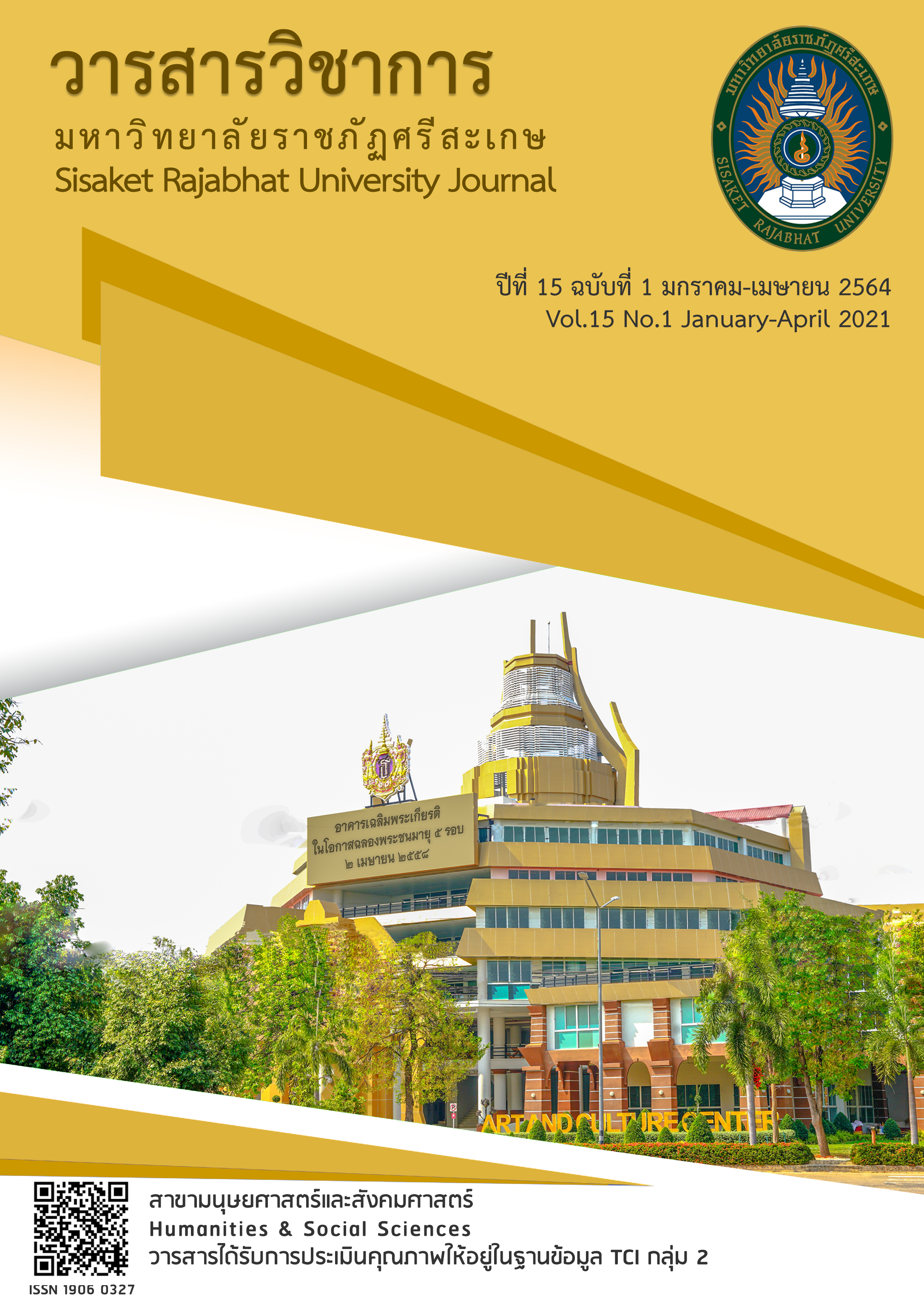Students’ Perspectives on Perceived Levels of Intelligibility and Comprehensibility: Comparing the Accents of Native English Teachers (NETs) with Those of Non-Native English Teachers (NNETs)
Main Article Content
บทคัดย่อ
The overall objective of this study was to investigate adult Thai students’ perspectives on perceived levels of intelligibility and comprehensibility by comparing the accents of native English teachers (NETs) with those of non-native English teachers (NNETs) through the means of a questionnaire as part of a mixed methods research design. The study found that from students’ perspectives, the accents of NETs are more intelligible than the accents of NNETs on phonetic and grammatical levels. Nevertheless, when examining students’ perspectives on perceived levels of comprehensibility, it was found that the accents of NETs are not necessarily more comprehensible than the accents of NNETs. The findings of this study, thus, imply that in terms of overall comprehension of an utterance, students have the ability to comprehend and interpret non-native speech equally well as native speech throughout their daily interactions in English. Thus, in terms of students’ ever-day communication in English, communicative efficiency ends up being more important and necessary than native-like competence and performance. In the long-term, this ability ends up being even more of a necessary prerequisite, especially in international and intercultural environments where English functions in various forms, serves different purposes and where the internationalization of the language is highly evident, such as Thailand.
Article Details
1. เนื้อหาและข้อมูลในบทความที่ลงตีพิมพ์ในวารสารวิชาการมหาวิทยาลัยราชภัฏศรีสะเกษ ถือเป็นข้อคิดเห็นและความรับผิดชอบของผู้เขียนบทความโดยตรง ซึ่งกองบรรณาธิการวารสาร ไม่จำเป็นต้องเห็นด้วย หรือร่วมรับผิดชอบใด ๆ
2. บทความ ข้อมูล เนื้อหา รูปภาพ ฯลฯ ที่ได้รับการตีพิมพ์ในวารสารวิชาการมหาวิทยาลัยราชภัฏศรีสะเกษ กองบรรณาธิการไม่สงวนสิทธิ์ในการคัดลอกบทความเพื่อการศึกษา แต่ให้อ้างอิงแหล่งที่มาให้ครบถ้วนสมบูรณ์
เอกสารอ้างอิง
Akkakoson, S. (2019). Thai language learners’ sense of English ownership. PASAA, 58, 235-263.
Cheung, M.S. (2009). Native or non-Native? Exploring Hong Kong students’ perspectives. Papers from the Lancaster University Postgraduate Conference in Linguistics and Language Teaching, 4.
Comprendio, L., & Savski, K. (2020). ‘Asians’ and ‘Westerners’: Examining the perception of ‘(non-)native’ migrant teachers of English in Thailand. Journal of Multilingual and Multicultural Development, 41(8), 673-685. https://doi.org/10.1080/01434632.2019.1630419
Copland, F., Mann, S., & Garton, S. (2020). Native-English-speaking teachers: Disconnections between theory, research and practice. TESOL Quarterly, 54, 348-374. https://doi.org/10.1002/tesq.548
Diaz, N. (2015). Students’ Preferences regarding native and non-native teachers of English at a university in the French Brittany. Procedia-Social and Behavioural Sciences, 173, 93-97. DOI:10.1016/j.sbspro.2015.02.036
Goldsmith, A., & Dennis, N. (2016). An illumination of 3rd year, Thai-English major undergraduate students’ perceptions of native and Thai English teachers. International Journal of Research-GRANTHAALAYAH, 4(7), 27-65. DOI: 10.5281/zenodo.58690
Haeg, E. (2020, February 19). 3 solutions to Thailand’s English teacher shortage. The Taiger. https://thethaiger.com/news/national/3-solutions-to-thailands-english-teacher-shortage
Hwang, K., & Yim, S. (2019). The negative influence of native-speakerism on the sustainability of linguistic and cultural diversities of localized variants of English: A study of local and expatriate teachers in South Korea. Sustainability, 11(23), 1-20. https://doi.org/10.3390/su11236723
Ishaque, R. (2018). Empowering English speakers through diversification and promotion of World Englishes. Advances in Language and Literacy Studies (ALLS), 9(6), 93-100. DOI: http://dx.doi.org/10.7575/aiac.alls.v.9n.6p.93
Jindapitak, N., & Teo, A. (2011). Linguistic and cultural imperialism in English language education in Thailand. Journal of Liberal Arts, Prince of Songkla University, 3(2), 10-29. https://so03.tci-thaijo.org/index.php/journal-la/article/view/64759/53112
Jindapitak, N., & Teo, A. (2013). Accent priority in a Thai university context: A common sense revisited. English Language Teaching, 6(9), 193-204.
Jindapitak, N. (2014). English pronunciation teacher preference: Thai university English learners’ views. Proceedings of INTED2014 Conference, 10th-12th of March 2014 (4982-4991). Valencia, Spain.
Kalra, R., & Thanavisuth, C. (2018). Do you like my English? Thai students’ attitudes towards five different Asian accents. Arab World English Journal (AWEJ), 9(4), 281-294. DOI: https://dx.doi.org/10.24093/awej/vol9no4.21
Kanoksilapatham, B. (2013). Thai university students’ voices heard: Aspired pronunciation model. Journal of English Studies, 8, 124-153.
Kaur, P., & Raman, A. (2014). Exploring native speaker and non-native speaker accents: The English as a lingua franca perspective. Procedia: Social and Behavioral Sciences, 155, 253-259. https://doi.org/10.1016/j.sbspro.2014.10.288
Kirkpatrick, A. (2020). Englishes in the Expanding Circle: Focus on Asia. Russian Journal of Linguistics, 24(3), 551-568. https://doi.org/10.22363/2687-0088-2020-24-3-551-568
Nanni, A. (2021). Educational entrepreneurship in an intensive English program in Thailand: A case study. SAGE Open, 1-13. https://doi.org/10.1177/2158244021998694
Natiladdanon, K., & Thanavisuth, C. (2014). Attitudes, awareness, and comprehensibility of ASEAN English accents: A qualitative study of university students in Thailand. Catalyst, 9(1), 16-30.
Prakaianurat, P., & Kangkun, P. (2018). Language attitudes of Thai working adults toward native and non-native English varieties. MANUSYA: Journal of Humanities, 21(2), 92-111.
Rattanaphumma, R. (2013). Reconsidering objectives of English language learning in English as a lingua franca context. Proceedings in the Third Conference on Foreign Language Learning and Teaching (FLLT2013). Thammasat University, Bangkok. http://litu.tu.ac.th/FLLT2013/www.fllt2013.org/private_folder/Proceeding/456.pdf
Smith, L.E. (1992). Spread of English and issues of intelligibility. In B. Kachru (Ed.). The Other Tongue: English across Cultures. University of Illinois Press.
Smith, L.E. (2009). Dimensions of understanding in cross-cultural communication. In K. Murata & J. Jenkins (Eds.). Global Englishes in Asian Contexts: Current and Future Debates. Palgrave Macmillan.
Snodin, N., & Young, T. (2015). ‘Native-speaker’ varieties of English: Thai perceptions and attitudes. Asian Englishes, 173, 248-260. https://doi.org/10.1080/13488678.2015.1083354
Subedi, D. (2016). Explanatory sequential mixed method design as the third research community of knowledge claim. American Journal of Educational Research, 4(7), 570-577. DOI:10.12691/education-4-7-10
Suebwongsuwan, W., & Nomnian, S. (2020). Thai hotel undergraduate interns’ awareness and attitudes towards English as a lingua franca. Indonesian Journal of Applied Linguistics, 9(3), 704-714. https://doi.org/10.17509/ijal.v9i3.23221
Suwanarak, K. (2010). Can only native English speaking teachers teach aural and oral skills? ABAC Journal 30(2), 43-63.
Todd, R. (2006). The myth of the native speaker as a model of English proficiency. rEFLections-KMUTT Journal of Language Education, 8, 1-7.
Walkinshaw, I., & Oanh, D. (2014). Native and non-native English teachers: Student perceptions in Vietnam and Japan. SAGE Open, 4(2), 1-9. https://doi.org/10.1177/2158244014534451


